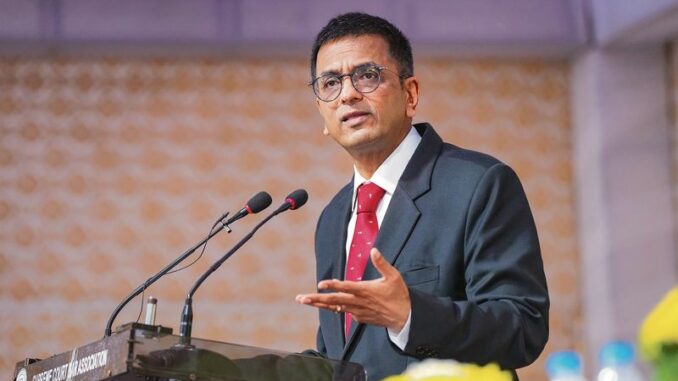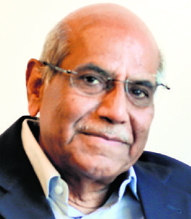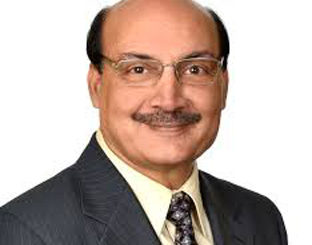
CJI turns spotlight on issues critical to democratic endurance of Indian State
“In a democracy, the winning of elections is not a license to dispense with the rule of law. Nor does it mean rule by the majority, because then this would violate the principle of equality before law. Secularism is part of the basic character of the Constitution, because ours is a multi-religious country and only secularism can ensure equality, irrespective of religious beliefs. Fraternity, which is a principle enshrined in the Preamble to the Constitution, is also part of its basic character, because without empathy and sense of togetherness, how can there be national unity and solidarity?
“The framers of the Indian Constitution acknowledged the diversity of India but sought to build a united country, not by suppressing its multiple identities but by transcending them in a larger and overarching brotherhood of equal citizenship. This is why we have individual-based rights which cannot be abridged by community identities. The temptation to appeal to communal identities for political and electoral gain can only undermine democracy in the long run by fragmenting society. Fraternity is as key an attribute of democracy as are liberty and equality. It is also the basis of national unity.”

It was reassuring to hear the Chief Justice of India, DY Chandrachud, unreservedly defend the ‘basic structure’ of the Indian Constitution as the ‘North Star’ which ‘guides and gives direction to its interpreters and implementers, when the path is convoluted’. This rejects the argument that Parliament, which itself is a creature of the Constitution, has the authority, by virtue of being representative of the people’s will through popular elections, to alter, amend and modify the Constitution in any manner it deems fit.
As India is celebrating 75 years of Independence, it is a good time to reflect upon the many triumphs of our democracy and its vulnerabilities as well.
I derived three key takeaways from his remarks: One, that the Constitution is supreme and the three organs of the State — the legislature, executive and judiciary — each derives its status and authority from the Constitution. Two, that while the Constitution could be amended through the procedure laid down in its various provisions, its ‘basic character’ could not be infringed. The basic character derives from the nature of the Indian State as a secular democracy assuring justice, liberty, equality and fraternity to all its citizens; and three, that only an independent judiciary can uphold the basic character of the Constitution.
These are important remarks by the Chief Justice and should put to rest the ongoing controversy over whether the notion of ‘basic character’ of the Constitution has any validity and the related question of the role of the executive in judicial appointments, which may compromise the independence of the judiciary. The notion of the basic character of the Constitution has become the bastion of citizens against a constant erosion of her fundamental rights by both the legislature and the executive. In a democracy, the winning of elections is not a license to dispense with the rule of law. Nor does it mean rule by the majority, because then this would violate the principle of equality before law. Secularism is part of the basic character of the Constitution, because ours is a multi-religious country and only secularism can ensure equality, irrespective of religious beliefs. Fraternity, which is a principle enshrined in the Preamble to the Constitution, is also part of its basic character, because without empathy and sense of togetherness, how can there be national unity and solidarity?
The Constitution has assured its citizens certain fundamental rights, such as right to freedom of expression and association, equality, religion and privacy. Since the Constitution came into force in 1950, there have been repeated attempts by successive political dispensations to limit, if not, erase these rights, either in the purported pursuit of social or economic goals or in the name of national security or defense. The notion of the basic character evolved to check this attempted erosion of the rights of citizens against a predatory state.
Justice Chandrachud’s remarks were made in a speech honoring the memory of one of India’s great jurists, Nani Palkhivala.
Palkhivala was a passionate defender of the fundamental rights of citizens, and to him goes the credit for the doctrine of the basic character of the Constitution becoming an accepted legal principle. In his arguments in favor of the doctrine, Palkhivala pointed to the post war constitutions of both Japan and Germany, which had made fundamental rights of citizens, eternal, inalienable and inviolable. This was done, he pointed out, to prevent in future the ‘extreme amendments’ which had enabled the snuffing out of democratic institutions and processes, for example, in Nazi Germany. Another eminent former judge of the SC, Justice Rohinton Nariman, had in a speech a few years ago, given an example of the danger of similar ‘extreme amendment’ in India. When the Emergency was declared by Indira Gandhi in 1975, she proposed a constitutional amendment which would have made the President, PM and Speaker of Lok Sabha exempt from any judicial proceedings for their lifetime by virtue of the office they occupied. A later version added Governors to this list. While these were dismissed as being incompatible with the principle of equality before law, one can see how this danger to democracy is always lurking.
What is heartening is that though there have been several instances when India’s democracy has been under threat, there were eminent political, legal and civil society figures who emerged as sentinels of the rights of our citizens. Palkhivala was one of them. If PM Modi is able to rightfully proclaim India as the ‘mother of democracy’ today, the credit must also go to the brave defenders of the constitutional order.
We live in a globalized world where the density of engagement and interaction among people of different ethnicities, speaking different languages, adhering to different religious and cultural identities and professing different ideologies, is unprecedented. The future will belong to societies that are able to handle immense diversity, which celebrate plurality and possess an innate cosmopolitan temperament. India is one such society and its success in managing diversity is inseparable from its democratic dispensation.
The framers of the Indian Constitution acknowledged the diversity of India but sought to build a united country, not by suppressing its multiple identities but by transcending them in a larger and overarching brotherhood of equal citizenship. This is why we have individual-based rights which cannot be abridged by community identities. The temptation to appeal to communal identities for political and electoral gain can only undermine democracy in the long run by fragmenting society. Fraternity is as key an attribute of democracy as are liberty and equality. It is also the basis of national unity.
India is celebrating 75 years of its Independence. This is a good time to reflect upon the many triumphs of our democracy and its vulnerabilities as well. We should thank the Chief Justice for turning the spotlight on issues which are critical to the democratic endurance of the Indian State.
(The author is Former Foreign Secretary and Senior Fellow, Centre for Policy Research)





Be the first to comment